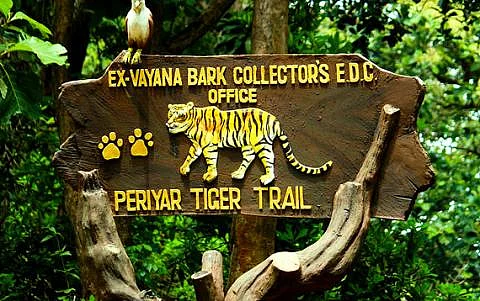

For the last 45 years these men have been dependent on the forests of Idukki district – once as poachers and smugglers, and now as its protectors. In 1996, Eco Development Committees (EDC) were formed in the Periyar Tiger Reserve in Kerala’s Idukki district with assistance from the World Bank’s India Eco Development Project, which aimed to protect forest resources and also help people dependent on the forests to earn a livelihood. Although the project has four types of EDCs today, the first one – the ex-vayana EDC – was made up of former smugglers. (Vayana is the bark of the cinnamon tree, which was smuggled by these men.) When the EDC was first formed, it had 23 members but the number dwindled to 10 around 19 years ago and has remained constant since. This year, the EDC is celebrating its 19th anniversary, and the success of checking over 300 instances of poaching and smuggling inside the Periyar Tiger Reserve. Some of the ex-vayana members including chairman of the group PJ Koshi, CC Thomas, KP Ansari and VJ Kunjumon who are in their early 50s now, had started smuggling forest goods when they were 15 years old. “Poverty had forced us to steal goods from the forests. Mainly we smuggled vayana (bark of the cinnamon tree). All of us were caught at different times and fighting the court cases took a lot of money,” Koshi says. When they caught some of these poachers, the forest department offered them a way out – the cases against them would be dropped if they helped the department catch other smugglers. “We had realized our mistake, and when the department proposed such a project we accepted happily. They gave us training and awareness on forest conservation and protection,” says Thomas. While the forest department trained them in tourist activities, these men brought their own unmatched expertise to the table. “We knew the modus operandi of the smugglers, we knew every nook and corner of the forests, and we had a clear idea of which routes smugglers would take to get the goods out of the forest, which market they would approach… All this (knowledge) helped the department to catch them,” he adds. Gradually, poaching and felling of valuable trees from the forests slowly reduced. The ex-vayana EDC received NGO Junglees’ Green Guard award in 2002 and has also bagged state awards. The state of West Bengal had sought the help of Kerala Forest Department to implement same scheme in the Sundarbans National Park. Despite these accolades, the EDC’s members do not have it easy. “We were 23 in the beginning. Four committed suicide because of severe economic problems. Back then, we were not paid regularly and had many loans to fight the cases against us,” Koshi says. Eventually, they began to get fixed salaries, but these too, were quite low. They are paid between Rs 7000 to Rs 8000 per month, which is inadequate to look after their families’ needs. They have no savings. “Most of us are over 50. We have no idea how long we can move inside the forest so easily. Though we have been serving the government for 19 years now, they have not made us permanent staff. We won’t have pension or allowances (when we retire). We don’t know how to live in our old age,” Koshi adds. Thomas feels somewhat cheated because of these circumstances. “We played a major role in preserving it. (were it not for us), nothing would have been left in the forest,” he says.